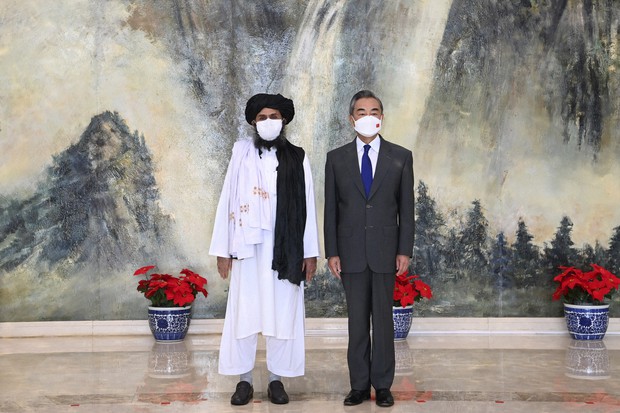

There are reasons why China is so keen on friendship with Taliban

Slowly but steadily, Taliban is taking charge of Afghanistan. And as the world grapples with the militant organisation’s new face of “reform”, China took the decisive step by becoming the first country to establish diplomatic channels with Kabul since the US-led NATO forces left the mountain country in April.
China’s rush to connect with Taliban is surprising given the fact that it was not really in the picture over the last two decades when Afghanistan was ruled by a government supported by the US. Chinese Ambassador to Afghanistan, H.E. Wang Yu, however, says that the Asian giant has provided aid worth millions of dollars to the war-ravaged country in the form of hospitals, solar power stations and much more.
China is keen to tell the world that they have been there even though not in a manner in which they have been present in Pakistan, Sri Lanka or any other country in need of Chinese investments.
“China and the Afghan Taliban have unimpeded and effective communication and consultation,” Chinese Foreign Ministry Spokesman Wang Wenbin said recently. It is quite obvious that China wants to replace US as the big brother in Afghanistan. Zhou Bo, an expert on the Chinese Army’s strategic thinking, wrote in his op-ed for The New York Times, “Beijing has few qualms about fostering a closer relationship with the Taliban and is ready to assert itself as the most influential outside player in an Afghanistan all but abandoned by the United States.”
China’s interests in Afghanistan
Economics reign supreme. The troubled country is sitting on deposits estimated to be in excess of $3 trillion, including lithium reserves — an essential resource for China, which is the world leader in producing lithium batteries that power electric vehicles and solar installations.
Also read: Explainer & timeline: How potent is Afghanistan’s Islamic State?
Afghanistan is also rich in gold, oil, bauxite, rare earths, chromium, copper, natural gas, uranium, etc. The mineral-rich nation presently lies unexplored, a reason good enough for China to get close with Taliban.
China wants to tap into Afghanistan’s unexplored lithium reserves in return for mining rights and ownership arrangements.
Beijing also sees Kabul as a worthy future partner in expanding its Belt and Road Initiative (BRI) beyond Pakistan. It is already in talks with Pakistan and Taliban to build a road connecting Peshawar in Pakistan with Kabul, thus creating a better access to markets in the Middle East. Bringing in Afghanistan to expand Belt and Road Initiative would also mean making India’s opposition to the initiative less consequential.
But China’s friendship with Afghanistan is not unconditional
Beijing is apprehensive of Taliban renewing its support to Uyghur Islamic extremists, known to create trouble in western China. Also called the Turkistan Islamic Movement (TIM), the extremists aim to create an independent state called East Turkestan in the place of Xinjiang.
China believes that TIM poses a direct threat to China’s national security and territorial integrity.
Taliban vociferously supported TIM once because China allegedly gave effect to human rights abuses against the local Muslim Uyghur population in Xinjiang.
WATCH: Can China fill the financial vacuum created in Afghanistan?
Analysts, however, say the Turkistan Islamic Movement is too weak right now to revive its operations in China. Nevertheless, Beijing wants to play safe.
On its part, China’s foreign minister Wang Yi told Taliban leader Mullah Abdul Ghani Baradar in July that Beijing wants the militant organisation to disassociate itself completely from “all terrorist organisations including the TIM.”
Stable Afghanistan good for China
China definitely wants a stable Afghanistan to best serve its economic interests. Friendship with Beijing is favourable for Taliban because the superpower can give them what they need the most — political impartiality and economic investment. Zhou Bo further wrote in the New York Times Op-ed: “Afghanistan in turn has what China most prizes: opportunities in infrastructure and industry building — areas in which China’s capabilities are arguably unmatched — and access to $1 trillion in untapped mineral deposits.”
To best serve China’s interests, Taliban will be keen to take along warring warlords, offer some human rights for women and minorities and keep terrorist elements at bay. There is a strong possibility that Taliban would change for the good and shed its image of a ruthless militant organisation that it was 20 years back. US support is a must though. President Joe Biden still can isolate any new Taliban-led government on the world stage and stop most companies from doing business in the country.
The U.S. can also veto any moves by China and Russia to ease United Nations Security Council restrictions on the militant group.


